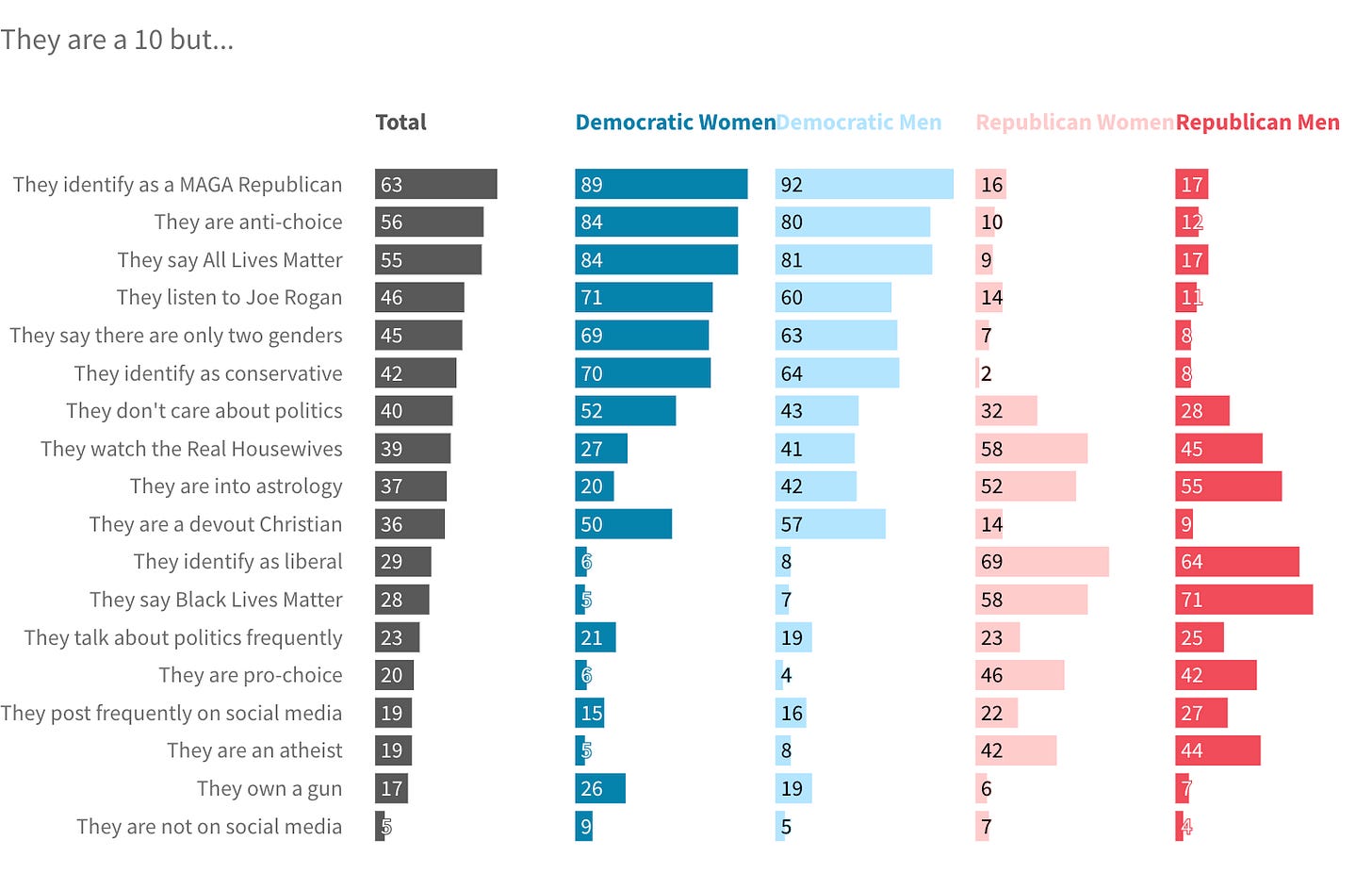Gen Z doesn’t date across party lines; How to avoid a second civil war; Red lawmakers use more polarizing language - BCB #21
A new, newsier format for the Bulletin
Welcome to issue 21 of the Better Conflict Bulletin. We are experimenting with a new format that expands our analysis of recent interesting things in the conflict space. We’ll be keeping our podcast, and also continuing to post some longer analysis and opinion articles. Do let us know how it’s working for you!
Young Voters Approve of Democratic Policies But Don’t Credit the Party
This surprisingly deep analysis by Teen Vogue has a wealth of data on what Gen Z thinks about the Democratic party. But the gold is from this survey on partisan dating habits:
As we’ve noted before, people are less and less willing to date across political lines, but we’ve never seen this reluctance laid out quite so starkly. One thing that jumps out at us: there seem to be more strong dealbreakers for Blue than Red. This could just be an artifact of the survey questions they chose to ask, but it’s also representative of a broader pattern where Blue is less tolerant of Red than Red is of Blue. For example, Blue is twice as likely (20%) to say they have ended a friendship over politics than Red (10%). Another interesting find is that throughout the survey of 1173 young people, Democratic party policies seem to be more popular on average. However, these younger voters are less likely to credit Democratic politicians for their policy accomplishments.
The U.S. is Heading Toward a Second Civil War. Here Is How We Avoid It
This is probably the best single article on U.S. polarization, and what we can do about it, that we’ve seen in years. Dr. Peter Coleman is a social psychologist who has worked on conflict and polarization for decades, including writing the book Overcoming Toxic Polarization, which offers a roadmap out of the partisan crisis in the US. In this article he maps out certain macro and micro-drivers of division.
These forces are deeply interconnected, and create a reinforcing system. But approaching these on a personal level is something very different from mere research, so he undertook a month-long depolarization experiment with a small group of friends and colleagues. The idea was to to try to overcome these toxic patterns in themselves. They found that mere exposure to the other side, such as seeing them in mundane settings, like in the park or the workplace, is one of the most effective ways to combat polarization; and that the process of depolarization is convoluted and emotionally taxing for the participants, yet a powerful form of self-discovery.
How we're trying to address trust and polarization in news
Just-launched news organization Semafor, headed by executive editor Gina Chua (former executive editor at Reuters), is rethinking news reporting to battle polarization. Semafor wants to restructure the traditional article by breaking it into facts, followed by their views on the facts, and then opposing views to supplement an unbiased analysis. With other big names involved, such as Buzzfeed founder Ben Smith, this is the most serious attempt we’ve seen to change the way journalism is done in a polarized era.
For Trump’s Backers in Congress, “Devil Terms” Help Rally Voters
In less positive news, this New York Times analysis of language used in tweets and speeches shows that GOP lawmakers who contested the election have far outpaced other Republicans and Democrats in fueling polarization. The Times studied lawmakers’ rhetoric by evaluating nearly three million tweets, more than 100,000 email newsletters, 300,000 Facebook ads and 350,000 statements from the Congressional Record from 2010 through this past June.
This analysis looked at specific terms previously identified by researchers as polarizing, everything from “fascist” to “left-wing.” This sort of analysis is subject to selection bias of course, where one side could look worse simply because of the terms chosen, but the team did make some efforts to ensure that each term added was balanced by its opposite-party equivalent. While both Democrats and Republicans in Congress used more inflammatory language after the 2016 election, there was a sharp uptick on the GOP side after 2020, particularly among those who objected to certifying the results of the 2020 election.
Quote of the Week
We are both navigating a time of considerable crisis that is fracturing us and may sink us and being presented with an opportunity to choose a path less-traveled and head in a more promising direction. The trick is knowing how to do it.


